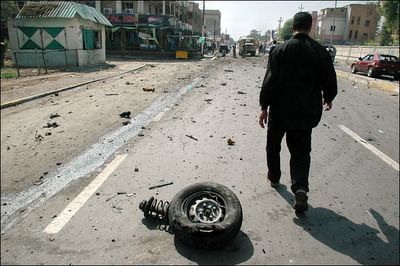My View From Las Vegas
Friday, April 29, 2005

Alan Chin for The New York Times
The attacks in Iraq today sent a bloody reminder to the new government of the array of challenges it must tackle.
April 29, 2005
Rebels Respond to New Iraqi Coalition With Wave of Attacks
By RICHARD A. OPPEL Jr.
and ROBERT F. WORTH
BAGHDAD, Iraq, April 29 - Insurgents executed a devastating series of coordinated attacks on Iraqi forces today, just a day after the new Iraqi government was announced, detonating 10 cars bombs across greater Baghdad that killed at least 30 people, mostly members of the Iraqi security forces, and wounded 99 others.
The attacks, a direct challenge to Iraq's new Shiite-dominated government, were aimed at Iraqi police officers and national guardsmen at their bases or traveling in convoys in northern and southern Baghdad and in Madaen, 15 miles southeast of the capital. They were followed by a car-bomb attack in Diyarah, in the restive western province of Anbar, that killed two American soldiers, and another near Taji, just north of Baghdad, where one American soldier was killed and two others were wounded.
The coordinated morning strikes came after a momentous and tumultuous day for the incoming Iraqi government.
After three months of delays that American officials have said gave new strength to the insurgency, the dominant Shiite alliance won approval for a new cabinet on Thursday - but not before angering Sunni political leaders who charged that they had been shortchanged. Sunni Arabs, who dominated Iraq's Baathist government under Saddam Hussein, largely boycotted the January elections. They received 6 of the 32 cabinet appointments approved by the new National Assembly.
The Shiites also pledged a large-scale house cleaning of former Baathists from the government, a move sure to drive an even deeper wedge between the Shiites and the Sunnis, who make up most insurgent activity.
In the streets, insurgents used an increasingly common tactic today: multiple bombings designed to kill not only the victims of the initial blast but also security forces and bystanders who rushed to the aid of the wounded.
The attacks began just after 8 a.m. today, the weekly holy day for most Iraqis, with four car bombs in the Ahdamiya neighborhood, a heavily Sunni district in northern Baghdad that is home to many former Baathists and insurgent sympathizers. The attacks there killed 7 Iraqi national guardsmen, 2 policemen and 4 civilians and wounded 50 others, an Interior Ministry official said.
The first Adhamiya bomb went off next to a popular restaurant as an Iraqi convoy drove by, the police said. The blast propelled the crumpled remains of the bomber's vehicle more than 100 feet, where police at the scene pointed to what they said were body parts of the suicide bomber lodged in the charred wreckage, including bony remnants of an arm. Several pools of blood surrounded an aqua blue minivan in front of the destroyed restaurant. A child's stuffed animal, blackened from the blast, and two brands of women's sandals were strewn about the bloody debris.
"It was terrible," said Muhammad Kadham, a 27-year-old worker, who had rushed to the scene. "Human body parts were everywhere. Ambulances have been busy carrying away the injured" amid the shouting of anxious police officers and guardsmen who tried to keep people away, he said. "It was insane."
A few hours later, a car bomb aimed at a passing convoy of Iraqi National Guard troops detonated in the Ghadeer district of southern Baghdad, and 15 minutes later a second car bomb exploded in the same spot, killing a civilian and wounding four troops and four civilians, an Interior Ministry official said.
In Madaen, a flashpoint town on the Tigris River that has seen insurgent activity and intense sectarian violence between Sunnis and Shiites, three car bombers struck in a coordinated attack that left 3 Iraqi police commandos, 4 Iraqi soldiers and 2 civilians dead and 38 others wounded, the Interior Ministry official said.
The violence, which the American military said was clearly aimed at discrediting the new Iraqi government, showed that even after a lull in attacks following the successful Jan. 30 elections, the insurgents continue to possess the resources and organizational structure to mount a disciplined strike across the capital.
"Terrorists have still proven they can execute or surge their capability to conduct limited attacks," a statement issued by the United States military here said.
The network of Abu Musab al Zarqawi, Iraq's most wanted man, took responsibility in an Internet statement for several of the Baghdad suicide bombings as well as for attacks elsewhere in Iraq. Altogether, the group said, it launched a dozen attacks today, dedicating them to the memory of Omar Hadeed, an insurgent leader killed fighting American forces in Falluja in November.
The group also made public an unusual 18-minute audiotape, said to be of Mr. Zarqawi, in which the speaker offered reassurances to resistance fighters, warned against efforts to negotiate a treaty and cited Pentagon data on shortfalls in American military recruiting.
The commander of United States troops in Baghdad, Maj. Gen. William G. Webster Jr. of the Third Infantry Division, described today's attacks as "another desperate attempt to try to derail the emerging democratic government."
"Today was just another spike that comes periodically," General Webster said in an interview on CNN, adding that his "message back to Zarqawi is that he's not going to win."
Copyright 2005 The New York Times Company | Home | Privacy Policy | Search | Corrections | RSS | Help | Back to Top

